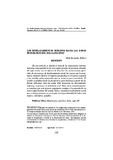| dc.rights.license | http://creativecommons.org/licenses/by-nc-sa/3.0/ve/ | |
| dc.contributor.author | Bermúdez Briñez, Nilda | |
| dc.date.accessioned | 2016-05-12T18:15:42Z | |
| dc.date.available | 2016-05-12T18:15:42Z | |
| dc.date.issued | 2015-01 | |
| dc.identifier.issn | 1316-7790 | |
| dc.identifier.uri | http://www.saber.ula.ve/handle/123456789/41908 | |
| dc.description.abstract | En este artículo se aborda el tema de las migraciones internas hacia las zonas petroleras de esta región durante las primeras décadas del siglo veinte, con el objetivo de describir las características generales de ese proceso de desplazamiento social, las causas que lo originaron, situación laboral, el impacto que produjo en el espacio regional y las medidas gubernamentales que se tomaron para controlarlo. El estudio se plantea desde la perspectiva socio-histórica a partir de las fuentes utilizadas, entre las cuales debe destacarse las documentales impresas, la prensa y el testimonio oral. Entre otras consideraciones, se concluye que este proceso migratorio condujo a la creación de un nuevo mapa humano del estado Zulia y constituyó un fenómeno social que se da por primera vez en el país con la peculiaridad de haber sido masivo, voluntario y pacífico. | es_VE |
| dc.language.iso | es | es_VE |
| dc.rights | info:eu-repo/semantics/openAccess | |
| dc.subject | Migraciones | es_VE |
| dc.subject | Petróleo | es_VE |
| dc.subject | Zulia | es_VE |
| dc.subject | siglo XX | es_VE |
| dc.title | Los desplazamientos humanos hacia las zonas petroleras del Zulia (1914-1933) | es_VE |
| dc.title.alternative | Population movements toward the oil zones of Zulia (1914-1933) | es_VE |
| dc.type | info:eu-repo/semantics/article | |
| dc.description.abstract1 | Inner migration to oil zones of t during the first decades of twenty century is analyzed in this article in order to describe general features of this social displacement process such as causes, employment status, the impact produced in the regional space, as well as the government policies taken to control it. The study is considered from the socio-historical perspective based on the sources used like the printed documentaries, the press and the oral testimony. Among other considerations, it is concluded that this migration process led to the creation of a new human map of Zulia state and it was a social phenomenon that occurred for the first time in the country with the peculiarity of having been massive, voluntary and peaceful. | es_VE |
| dc.description.colacion | 133-160 | es_VE |
| dc.description.email | icdnbb@cantv.net, nildabermudez@hotmail.com | es_VE |
| dc.description.frecuencia | Semestral | |
| dc.identifier.depositolegal | pp199802ME291 / ppi201202ME4022 | |
| dc.identifier.eissn | 2244-8454 | |
| dc.publisher.pais | Venezuela | es_VE |
| dc.subject.facultad | Núcleo Rafael Rangel (NURR) | es_VE |
| dc.subject.keywords | Migration | es_VE |
| dc.subject.keywords | Oil | es_VE |
| dc.subject.keywords | Zulia | es_VE |
| dc.subject.keywords | Twenty century | es_VE |
| dc.subject.publicacionelectronica | Agora Trujillo | |
| dc.subject.seccion | Agora Trujillo: Sociohistoria | es_VE |
| dc.subject.tipo | Revistas | es_VE |
| dc.type.media | Texto | es_VE |


